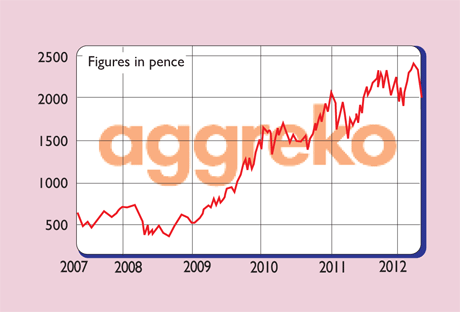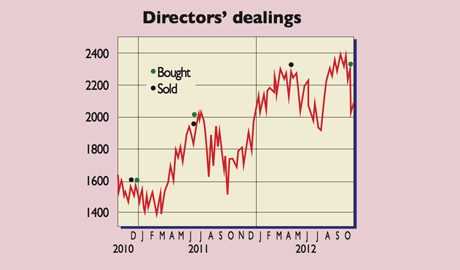Shares in focus: Give your portfolio a power boost
Aggreko is an excellent company, but are the shares good value? Phil Oakley investigates.
Get the latest financial news, insights and expert analysis from our award-winning MoneyWeek team, to help you understand what really matters when it comes to your finances.
You are now subscribed
Your newsletter sign-up was successful
Want to add more newsletters?

Twice daily
MoneyWeek
Get the latest financial news, insights and expert analysis from our award-winning MoneyWeek team, to help you understand what really matters when it comes to your finances.

Four times a week
Look After My Bills
Sign up to our free money-saving newsletter, filled with the latest news and expert advice to help you find the best tips and deals for managing your bills. Start saving today!
Aggreko is an excellent company, but wait for a better buying opportunity, says Phil Oakley.
The business
Aggreko designs and makes mobile gas and diesel electricity generators and temperature control equipment. These are either operated by Aggreko or rented out to customers. The company's local service-centre business rents out equipment to customers such as sporting or music events organisers or to offices where the air conditioning has broken down. In times of natural disasters, it is often Aggreko's equipment that keeps the lights on.
Aggreko also operates as a power producer in its own right, particularly in countries where the local electricity company doesn't have enough capacity, and provides power to installations such as oil and gas rigs and mines. Aggreko has more than 8,000 megawatts (MW) of temporary power generators (more than British Gas in the UK), 990 MW of chillers, and cooling towers and air conditioners. It made sales of £1.4bn in 2011.
MoneyWeek
Subscribe to MoneyWeek today and get your first six magazine issues absolutely FREE

Sign up to Money Morning
Don't miss the latest investment and personal finances news, market analysis, plus money-saving tips with our free twice-daily newsletter
Don't miss the latest investment and personal finances news, market analysis, plus money-saving tips with our free twice-daily newsletter
The history
The company was founded in Holland in 1962 when it started out as a small mobile-energy-generation rental business. Over the next decade it expanded across other parts of Europe. By 1973, Aggreko had moved to Scotland where it began to benefit from a booming North Sea oil and gas industry.
The 1980s saw lots of change. Aggreko was bought by transport company Christian Salvesen in 1984 and it entered the American market a couple of years later. In 1987 it went into the temperature control business. The 1990s saw more expansion and Aggreko being spun off from Salvesen. In the early 2000s it continued to grow its global footprint, but times were tough as trading in North America and Europe turned downwards.
A new operating model and strategy soon worked wonders. Shortages of electricity capacity, particularly in developing economies, saw the company spend lots of money building new generators. Aggreko also benefitted from a number of high-profile projects, including several Olympic Games and football World Cups. This investment has paid off handsomely as sales and profits have soared since 2005.
Shareholders haven't done too badly either. Anyone buying the shares at the beginning of 2005 has seen a total return on their investment of more than 900%, compared with a paltry 33% from the FTSE All-Share index.
The chief executive
Aggreko is led by Rupert Soames, the grandson of wartime prime minister Sir Winston Churchill. He has been chief executive since 2003, having previously worked for software company Misys.
Soames has some forthright views on how to run a business. He's very big on customer service and has hammered this into the company culture at Aggreko. He also prides himself on being able to tell the difference between good and lucky managers. He argues that many people can just look good if they are in the right place at the right time. He will therefore often stand by a talented manager working in horrible markets.
Nonetheless, it's difficult to judge Soames given that Aggreko itself has ridden a bull market in temporary power for some time now. He doesn't look to be doing much wrong though. You don't hear too many people complaining about the £1.4m he took home last year.
Should you buy the shares?
Given the company's phenomenal success in recent years, it's only natural to ask whether the good times can last. A lot will depend on what happens to the world economy. A slowdown or a recession would mean that Aggreko's generators would be used less and at lower prices. There's also a risk that some customers might not pay their bills.
That said, a lot of the world remains short of power. People in developing markets are getting richer and are using more things that need electricity. The trouble is that the supply of electricity in many of these countries is growing slower than demand and is leading to shortages. Throw in the fact that many of the western world's power stations are at the end of their working lives and need replacing and you can see that Aggreko's generators can be busy keeping the lights on for a while yet. More importantly, Aggreko is still building more generators and should keep growing.
Better still, Aggreko is many times bigger than its nearest competitor. This means it can do things that others cannot. It sells to lots of different industries and can move its generators across the world at short notice and keep them earning money. Its scale also means it can do this at a lower price. This keeps competition at bay and allows Aggreko to earn large profits.
Life looks set to get a little tougher for Aggreko going forward. Profits should still grow, but not as fast as they have done in recent years. Weaker economies mean that more of its customers are not paying their bills, but this is nothing to worry about at the moment. That said, it probably makes sense for Aggreko to scale back its investments a little.
Overall, we like Aggreko's business model and the long-term outlook for its products. Unfortunately, we don't particularly like the price of its shares at the moment. They still remain very high when compared with profits. An investment at current prices may therefore take a while to pay off. With City analysts trimming their profit forecasts, patient investors may be able to get in at a better price than today's. So for now, stick this excellent company on your watchlist.
The numbers

Stockmarket code: AGK
Share price: 2,066p
Market cap: £5.5bn
Net assets (June 2012): £926m
Net debt (June 2012): £678m
P/e (current year estimate): 20.3 times
Yield (prospective): 1.1%
What the analysts say
Buy: 12
Hold: 10
Sell: 3
Average price target: 2,478p
Directors' shareholdings

R Soames (CEO): 303,797
A Cockburn (FD): 118,482
K Hanna (chairman): 13,438
Get the latest financial news, insights and expert analysis from our award-winning MoneyWeek team, to help you understand what really matters when it comes to your finances.
Phil spent 13 years as an investment analyst for both stockbroking and fund management companies.
-
 Should you buy an active ETF?
Should you buy an active ETF?ETFs are often mischaracterised as passive products, but they can be a convenient way to add active management to your portfolio
-
 Power up your pension before 5 April – easy ways to save before the tax year end
Power up your pension before 5 April – easy ways to save before the tax year endWith the end of the tax year looming, pension savers currently have a window to review and maximise what’s going into their retirement funds – we look at how
-
 Somero: trading this overlooked bargain
Somero: trading this overlooked bargainFeatures Mechanical-screed maker Somero dominates its niche and is attractively valued. Matthew Partridge picks the best way to trade it.
-
 How to find big profits in small companies
How to find big profits in small companiesCover Story The small- and micro-cap sectors are risky and volatile. But with careful research and patience, investors could make huge gains. Matthew Partridge explains how to find the market’s top tiddlers.
-
 The hidden gems on Aim, London's junior market
The hidden gems on Aim, London's junior marketFeatures Aim, London’s junior market, is risky – but you can find solid stocks at low prices. Scott Longley reports.
-
Three Aim-listed firms that will thrive in a post-Brexit world
Opinion Matt Tonge and Victoria Stevens of the Liontrust UK Smaller Companies Fund pick three Aim-listed firms that will survive Brexit turmoil.
-
Fetch! The Chinese small-cap stocks to buy in the Year of the Dog
Opinion Each week, a professional investor tells us where she’d put her money. This week: Tiffany Hsiao of Matthews Asia selects three Chinese small-cap stocks with exciting potential.
-
Small and mid-cap stocks with big potential
Opinion Professional investor Guy Anderson of the Mercantile Investment Trust selects three small and medium-sized firms with promising prospects that the market has missed.
-
 Get cheap, reliable growth from smaller companies
Get cheap, reliable growth from smaller companiesFeatures One of the most reliable long-term investment trends is the long-term outperformance of smaller companies over blue chips. Max King picks some of the best ways to buy into this growth.
-
 Now the bitcoin bubble’s burst, what’s the next big thing?
Now the bitcoin bubble’s burst, what’s the next big thing?Features Forget bitcoin, if you want to increase your wealth faster than most other people, you need to find the next big thing. Merryn Somerset Webb suggests some places to look.